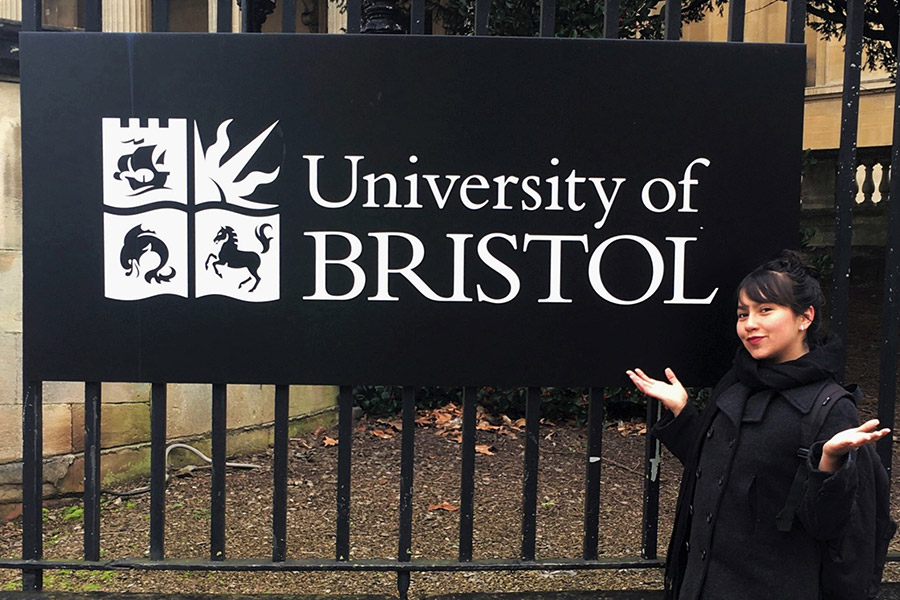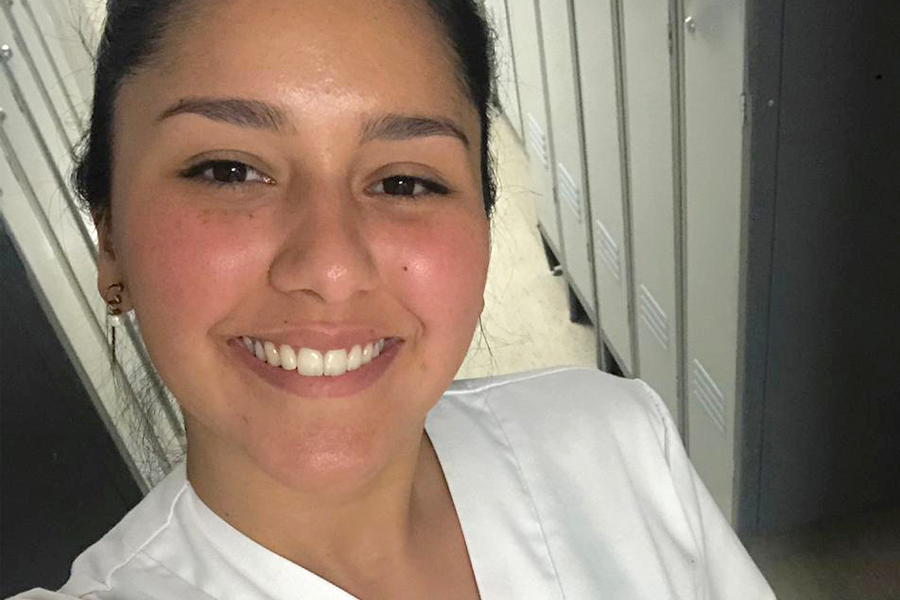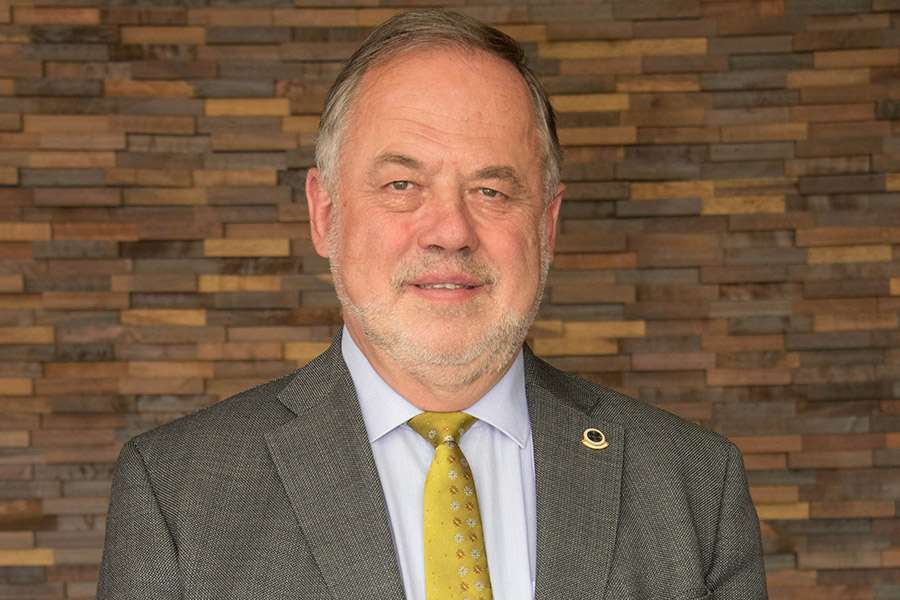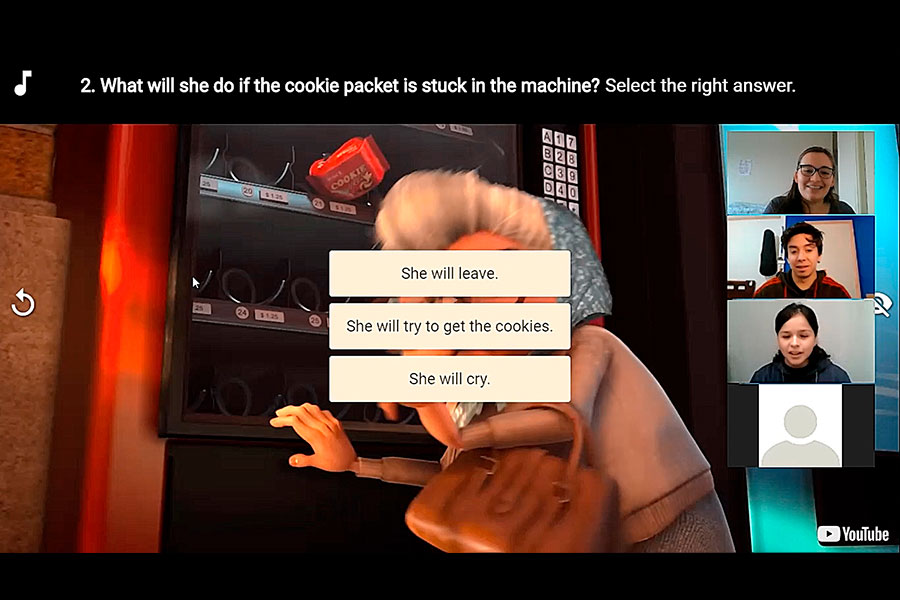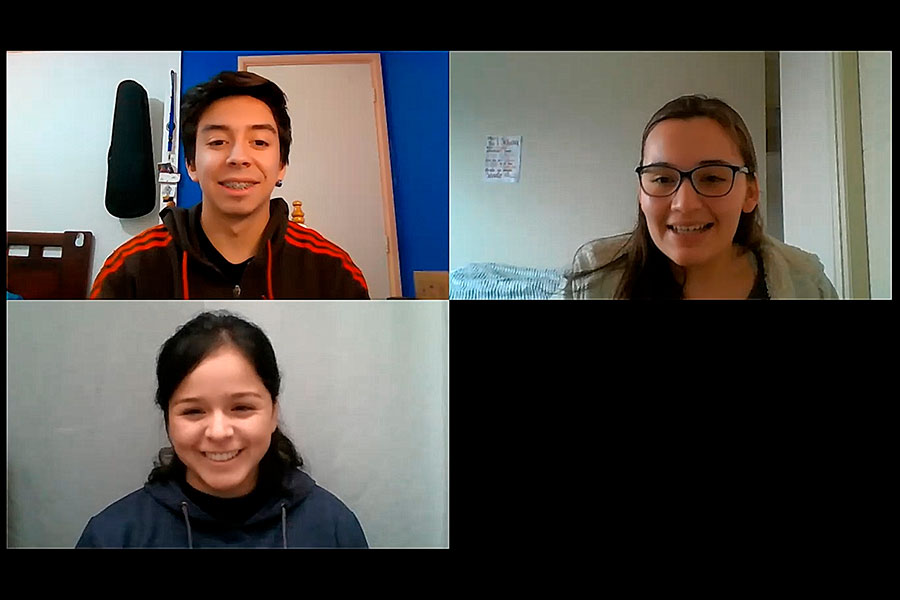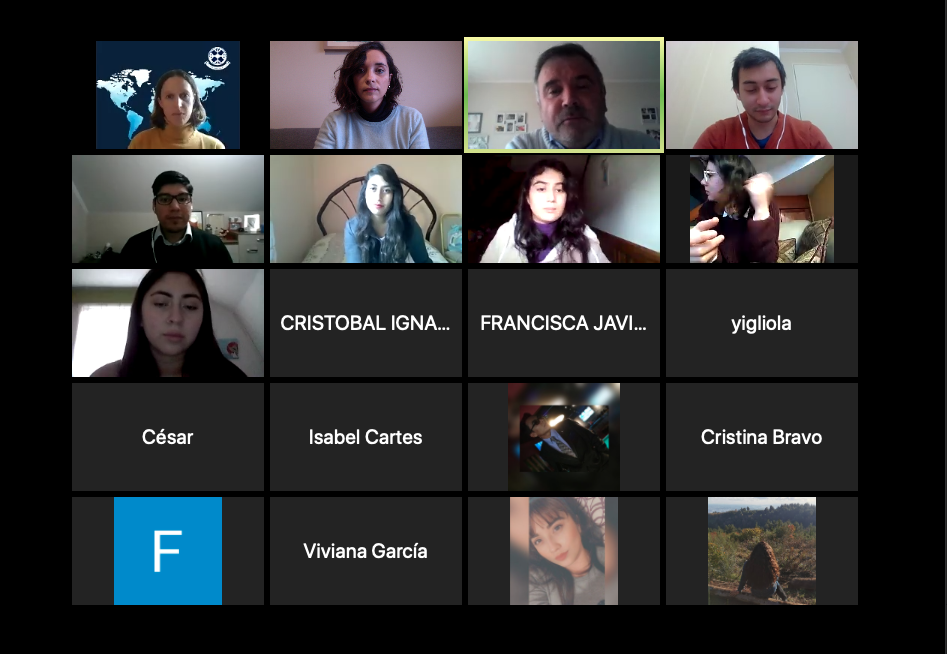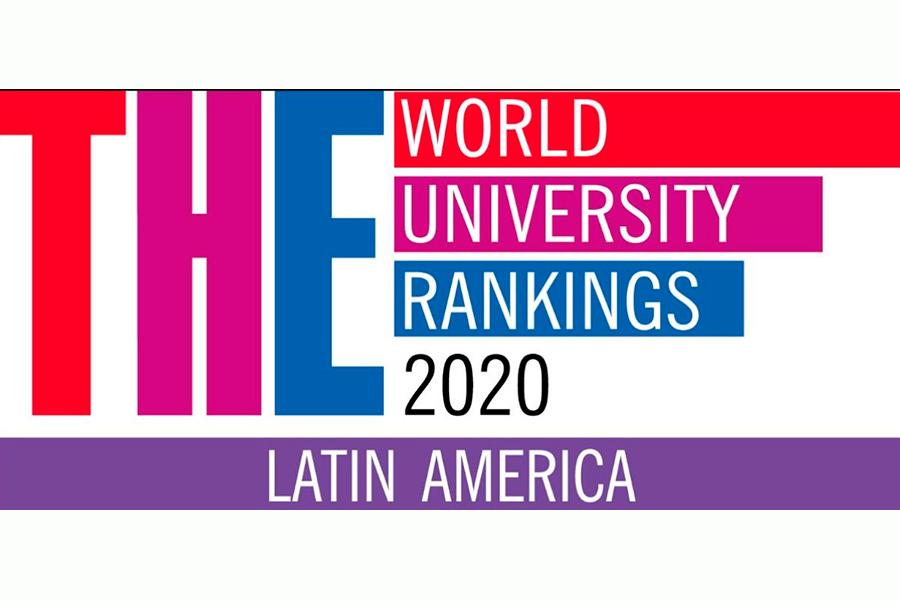|
The International Affairs Office provided continuous support for UFRO students abroad during the current health crisis. |
When Javiera Fuentes, who is a student at the Universidad de La Frontera (UFRO) and who went to England thanks to the program “English opens doors”, arrived after a 14-hour flight from Bristol, she was a little bit tired. But that was not only because of the long flight and the distance between these two countries. It was also because of all the great experiences she made during this opportunity of a lifetime. Despite the pandemic, the UFRO students who spent a semester abroad did everything possible to continue with their studies and the activities that were part of their exchange programs. “The first few days, I made some progress in the subjects I wanted to take. It was quite complex to deal with the health crisis, but at the University of Bristol everything kept working well. The classes, for example, were carried out remotely,” Javiera explains. Javiera was able to fulfill her objective and to acquire new language skills and knowledge, which will be very helpful for her English Teaching studies at UFRO. But she also emphasizes that this experience helped her to grow as a person and to acquire new skills when it comes to problem-solving in complex situations. Javiera Solano, who had started an internship at the Dr. Josep Trueta Hospital in Spain, had similar experiences. The young UFRO student of the Nursing program went to Spain thanks to the different agreements of UFRO with foreign universities – in this case of the Faculty of Medicine with the University of Girona. “I was able to work at the hospital for 2 months, when the university decided to send me back home, given the shocking spread of coronavirus. Actually, many exchange students had to consider their return. However, during the time I was there, first, I joined the Cardiac Intensive Care Unit and then the Endoscopy Unit. In addition, I also had another interesting challenge, which was the Catalan language. Although most people speak Spanish, they love to speak their own language,” she explains. It was a challenging time for Javiera Solano as well, but it helped her to see that she is capable of coping with any challenge, even when she is far away from home. “I’m glad that I got the chance to get to know the way a hospital of that size and complexity works – the shift system, the good treatment and friendliness between the teams and team members. All in all, it was a great learning experience that encourages me to look to the future in a positive way,” she points out. Some exchange students had to change their plans for the first semester of 2020. Some of them were able to complete the six months, and others only half of that, since the global situation caused by COVID-19 is highly complex. “As soon as the number of COVID-19 cases began to increase, the authorities proposed that the international students should return earlier,” explains Constanza Soto, who had just started her student exchange at Karlsruhe Institute of Technology in Germany. When she arrived in Germany, the UFRO student in Civil Industrial Engineering, with specialization in Bioprocesses, felt that everything was completely normal, but after a few days, she started to notice the consequences of the first outbreak of COVID-19 in Germany. “The university warned us very quickly and I had to finish the exams online. But the good thing is, that they offered us to carry out our exchange semester in 2021. At least, that is something that relaxes me a little bit. During this experience, I have learnt not to get frustrated that easily and that even this kind of situations can bring something positive,” she comments. All of the exchange students have been very grateful for the management of the International Affairs Office and the Student Mobility Unit of UFRO during this exceptional situation. In this regard, Dr. Lorena Vieli, the director of the International Affairs Office, points out: “The well-being of all our students who have been abroad since COVID-19 was declared a pandemic has been a clear priority for us. The Student Mobility Unit has been in permanent contact with all of them, in order to monitor their situations and to help them with their return. In this respect, the Chilean consulates abroad have also been an important support for the coordination of the students’ return and we are very happy that all our undergraduate students were able to get back home and that they are all in good health.”
Written by: UFRO Communications Office
|
|
|
Data exchange and “smart” citizens, who are autonomous and socially aware – these could be the keys for today’s cities in order to finally evolve to the concept of a smart city. The idea is to create smart cities with universal management standards to improve the citizens’ health, among others. This is especially important in the context of a pandemic, such as the one we are currently facing. It will clearly not end in 2020 and could appear again in the future, perhaps with other infectious agents. At least that is what the experts say, and the lessons we have learnt from Covid-19 cannot be ignored. We are aware that we must take care of ourselves within this pandemic, but how can the concept of a smart city help with that? As an example, I would like to quote a study of the World Economic Forum, which, based on an article by the Newcastle University in England, analyzed how different technologies for smart cities can help to track the movement of people in a city. These technologies are used to monitor the flow of pedestrians and public transport users, so it should also be possible to verify how many people are moving around, for traceability and social distancing purposes. In Temuco, the Smart Araucanía project is financed by the Inter-American Development Bank (IADB), the Production Development Corporation (Corfo) and the Regional Governments of Chile (GORE). It promotes an infrastructure to facilitate the interaction between startups, citizens, authorities and companies, and the Universidad de La Frontera (UFRO) is an active part of this endeavor. Within this framework, researchers from the Center for Software Engineering Studies (CEIS) and the Department of Electrical Engineering of the School of Engineering and Sciences are developing an app to monitor the air pollution in real time, and to obtain information from 30 different locations in Temuco. This is how “AIRE” – the app, which is already available in your App Store and Google Play and which is free of cost – allows you to know the levels of particulate matter in each of the locations and to receive an alert in case of any critical situation. Given the increase in the number of COVID-19-cases and the negative effect that the air pollution can have on the spread of the virus, the app is becoming a valuable guide for the citizens of Temuco. Once again, this is an example of how science and technology are at the service of people, especially in such hard times as we are currently facing, and UFRO is aware of that. |
|
The UFRO Language Coordination Center provides practical support for the students through English language tutorials online. |
During this online semester at the university Universidad de La Frontera (UFRO), the Language Coordination Center (CODI) of the Vice Rectorate for Undergraduate Affairs is providing the students with an English language tutorial service to keep up their learning progress and to improve their English language skills. In addition, it also offers a space that allows the students to clarify their doubts and questions about the lessons of the module they are taking. Felipe Opazo, the director of CODI, explained: “Our tutorials have always been a resource that is highly valued by our students. Therefore, we have made the necessary adjustments during this semester, for being able to perform them virtually. We are very happy that they have been well-received, what was shown in the high number of participants and the comments we received from the students and tutors.” Thus, through remote support sessions via Zoom, the UFRO students who enrolled in any of the English modules can register on the university’s Intranet platform and participate in these tutorials that will help them with their English learning process. In sessions with no more than three students each, a total of 19 tutors spend 20 minutes solving doubts and practicing the structures taught in class, and another 20 minutes working on and developing oral skills through different practice-based activities. “We haven't really had any major problems, just some issues with the internet connections. The students approach us on their own to ask their questions. It has been quite interesting to work with this methodology. It's a pleasure for me to carry out these tutorials and that the students also make their suggestions and give me some feedback on the tutorials,” Daniela Soto Sandoval, one of the tutors and a student in English teaching, commented. It is worth mentioning that the tutors and participants are not only students of the English Teaching program; other students of other programs of the university are also participating. They have been chosen because of their outstanding English language skills, their empathy and their experience in this kind of activities, in which they can support their peers and have a positive impact on their English learning process. “We are very happy and satisfied with the work of our tutors, who did not hesitate for a second to carry out this kind of online work and to contribute to the training of our students. At the beginning, it wasn’t an easy job, because of connectivity problems and the lack of technological resources. But the students have expressed their gratitude about being able to participate in these tutorials, and that motivates our tutors to continue with what they are doing and to improve each day,” said Valentina Sáez, who is in charge of this support program and who works as a teacher at CODI. Catalina Leyton is a nursing student at UFRO and currently taking an Intermediate English course at CODI. According to her, this e-learning support is a very positive contribution during the online semester. “I really appreciate the patience of the tutors and their willingness to help us. Besides, the lessons are very didactic and innovative and each tutor has his or her own way of teaching,” she pointed out. Finally, it is also worth mentioning that the support of CODI has been extended to students who have manifested a personal interest and motivation to continue working on their English language skills, although they already completed the language requirements of UFRO; either to improve their employment options, or for scholarship-related reasons for studying abroad.
Written by: Rocio Yañez Alvarez |
|
With a photo contest and a great experience acquired, the international students prepare for their return home. |
The International Affairs Office of the university Universidad de La Frontera (UFRO) and its Office of National and International Student Mobility organized a Farewell Ceremony for the foreign students who carried out a semester of academic exchange at UFRO during the first semester of 2020. Among the students, who came to UFRO for their academic exchange experience, are many students from Mexican universities, since UFRO maintains important ties with them in terms of student mobility and academic cooperation. During the second semester of 2020, six foreign students are going to carry out their academic exchange at UFRO – two from UNAM, three students from the Brazilian universities Universidade de São Paulo, Centro Paula Souza and Universidade do Estado de Santa Catarina, and one student from the Autonomous University of Barcelona (Spain). FAREWELL CEREMONY The Farewell Ceremony took place online, with the presence of the Rector, Dr. Eduardo Hebel; the Chief of Staff, Juan Carlos Parra; the Director of the International Affairs Office, Lorena Vieli; the Head of the Office for National and International Student Mobility, Consuelo Sánchez; and some of the members of the Sponsor’s Program for foreign students, which consists of voluntary UFRO students who help the foreign students when they first arrive at UFRO. For Consuelo Sánchez, who is in charge of the Office of National and International Student Mobility, this year has been quite particular. “Due to the COVID-19 pandemic, the students – whether they had decided to stay or to return to their home countries – had to reorganize their daily lives and to adapt to this new situation. In addition, like our UFRO students, they also had to make an effort to adapt to this new teaching and learning situation online.” One part of the ceremony was the announcement of the winners of the photo contest, called “Student Mobility in Times of a Pandemic”. The first place went to Sarahi Vega (UNAM), the second place to Noor González (UNAM), and the third place to Gloria Pérez (Michoacan University of Saint Nicholas of Hidalgo). It has been a semester full of challenges, and the Sponsor’s Program for foreign students at UFRO has made its greatest effort to ensure that the international students get the best experience possible, despite the current circumstances, and that they have a reason to return to the Universidad de La Frontera in the future.
Written by: UFRO Communications Office
|
|
This is another excellent achievement for UFRO. It is ranked in the top 50 of the Times Higher Education Latin America University Rankings 2020, in 6th place in Chile and in third place among the state universities in Chile. |
Once again, the university Universidad de La Frontera (UFRO) achieved to be one of the leading institutions for higher education at the national level. This time, it is ranked in the prestigious Times Higher Education (THE) Latin America University Rankings 2020 and achieved to be in the 46th place, what makes it part of Latin America’s 50 best universities. This recognition supports the leadership of this university, which has its own regional character. It is listed in the sixth place among all Chilean universities and in third place among the state universities in Chile. This THE ranking includes 166 universities across 13 countries in Latin America and is based on 13 performance indicators, with an emphasis on teaching, research, knowledge transfer and international outlook. In Chile, 30 universities were judged. In this regard, the Rector Dr. Eduardo Hebel Weiss pointed out: “In times like these, which are difficult for our society and our university, we are even happier to receive such a result. We have made significant efforts for being able to move forward within this pandemic and the fact that our university is in such a great position in an important ranking as this one encourages us and strengthens our commitment as a regional state university.” The Vice-Rector for Academic Affairs at UFRO, Dr. Renato Hunter, also appreciates this achievement and is very thankful for the permanent efforts of the academic staff and the university community in general, who maintain the Universidad de La Frontera in such a privileged position. “Our university can be proud, because it is a great achievement to be among the top 50 universities in Latin America. Besides, this result is supported by indicators that reflect the commitment and efforts of the people who are part of our university community and who are always trying to move forward with excellence, while facing the challenges of a complex university like UFRO. There is no doubt that the current global developments will help us to rethink the way we envision the university of the future and to face the constant challenges of this new era,” Dr. Hunter said.
Written by: UFRO Communications Office
|






